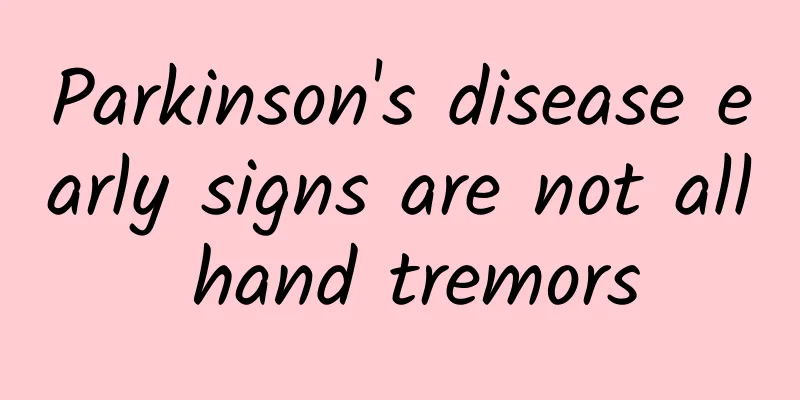Parkinson's disease early signs are not all hand tremors

|
□ Wang Mingyu April 11th of each year is World Parkinson's Day, which is not only to commemorate British doctor Dr. James Parkinson, but also to send blessings and care to those who are fighting against Parkinson's disease. As a neurosurgeon, I will lead you on a "journey of discovery" to understand the early symptoms, differential diagnosis and treatment of Parkinson's disease. The cause of Parkinson's disease remains to be solved Parkinson's disease may sound unfamiliar, but its incidence is not low. It ranks second among neurodegenerative diseases, second only to Alzheimer's disease (senile dementia). Imagine that your hands and feet begin to tremble involuntarily, your facial expression becomes stiff, and your walking becomes unsteady... This is the trouble that Parkinson's disease brings to patients. So, what exactly causes all this? The cause of Parkinson's disease has always been a complicated mystery. Some researchers believe that environmental factors are one of the causes. For example, long-term exposure to pesticides, insecticides or certain metal toxins may increase the risk of disease. Genetic factors also "play" an important role. About 10%-15% of patients have a family history. It is amazing that the power of genes is everywhere. In addition, factors such as immune system abnormalities, inflammatory mechanisms, oxidative stress and mitochondrial dysfunction may all be the "culprits" of Parkinson's disease. Be alert to small abnormal movements Parkinson's disease often comes quietly like an "uninvited guest". In the early stages, its symptoms are not obvious and are easily ignored. However, if we can capture these "hidden signals", we can take measures earlier and gain precious time for treatment. The symptoms of Parkinson's disease vary, among which the most typical are motor symptoms. At first, it may manifest as some minor abnormal movements, such as slight tremors in the fingers or toes when at rest. This tremor is usually not easy to detect, but it will become more obvious when you are nervous or tired. In addition, patients may feel some muscle stiffness, and their limbs movements become less smooth and natural. For example, buttons cannot be buttoned, and handwriting becomes smaller and smaller. Although these symptoms are mild, they are important clues to Parkinson's disease in the early stages. The patient's facial expression will also be affected, and he often looks serious and lacks vitality, which is the so-called "mask face". Parkinson's disease can also cause abnormal posture and gait, making people look a little weird. If your stomach and emotions are not "obedient", you should also pay attention to them. In addition to motor symptoms, Parkinson's disease is also accompanied by a series of non-motor symptoms. For example, you may find that your gastrointestinal function seems to have become "disobedient" and you often suffer from constipation; your sense of smell has become less sensitive, and you may even feel unfamiliar with some once familiar smells; and you may also have problems with sleep, such as dreaming, hallucinations, and shouting at night, which may even affect people around you. Parkinson's disease may also manifest as some changes in emotions and cognition in the early stages. Patients may feel depressed and have greater mood swings. At the same time, memory, attention, and thinking abilities will also be affected to a certain extent, manifesting as memory loss, slow thinking, etc. These symptoms may seem unrelated to Parkinson's disease, but in fact they may be important early signs of the disease. Although they are not as conspicuous as motor symptoms, they also cause considerable trouble to the patient's life. There are tips for identifying symptoms It should be emphasized that these symptoms are not specific to Parkinson's disease and may also be manifestations of other diseases. When diagnosing Parkinson's disease, doctors first need to carefully identify it. For example, Parkinson's plus syndrome is a disease that is easily confused with Parkinson's disease. In the early stages of the disease, there will be language and gait disorders, unstable posture, and the axial muscle tension is significantly higher than the limbs, but there is no resting tremor, and the response to levodopa is not obvious. The second is essential tremor, which is a slowly progressive disease with tremor as the only symptom, and it is reduced or disappears when at rest, which is very different from Parkinson's disease. In addition, there is depression. Although patients with depression may also have symptoms such as lack of expression and decreased movement, they are generally not accompanied by resting tremor and muscle rigidity, and have obvious low mood and lack of pleasure. Doctors need to accurately judge the patient's condition through detailed medical history and physical examination, as well as necessary auxiliary examinations. Combination of drugs and surgery is effective The treatment of Parkinson's disease is a comprehensive and full-course management process, including drug therapy, surgical treatment, exercise rehabilitation therapy, psychological counseling, and care and nursing, which requires multi-faceted collaboration and efforts. Among them, drug therapy is the first choice and the method throughout the entire course of the disease. Through reasonable drug matching and dosage adjustment, it can effectively relieve patients' symptoms and improve their quality of life. However, Parkinson's disease continues to progress, and drug therapy will gradually reach its limit. Fortunately, with the advancement of technology, neuromodulatory surgeries such as deep brain stimulation (DBS) have given Parkinson's patients a new life, and surgical treatment can further improve patients' symptoms; exercise rehabilitation therapy can help patients restore muscle function and balance; psychological counseling can help patients adjust their mentality and face the disease positively; and care and nursing are indispensable support for patients in their daily lives. The treatment of Parkinson's disease is not achieved overnight. It requires the joint efforts of patients, families and doctors. As long as you maintain a positive attitude and persist in treatment, I believe you will be able to defeat this "immortal cancer" and regain health and happiness. (The author is the attending physician of the Department of Neurosurgery of the First Hospital of Shanxi Medical University and a member of the Health Communication Working Committee of the Chinese Medical Doctor Association) |
<<: I bleed when I bump into something. Can this disease be prevented and treated?
Recommend
The unspoken pain of patients with gynecological tumors
The "unspeakable pain" that gynecologic...
What causes constipation in late pregnancy?
For most people with constipation, we just need t...
Skillful hands defuse mines! Xiangya Hospital successfully performs complex thyroid tumor surgery on a 76-year-old high-risk patient
Recently, Professor Li Xinying's team from th...
How many times does uterine involution need to be done?
Uterine involution is a relatively complicated op...
What should I do if the skin on the inner thigh root turns dark?
Many women who love beauty hope that their skin c...
Why do people wait for the new daughter-in-law to cook at her husband's house? What should I do if I wait for the new daughter-in-law to cook at her husband's house?
After many young girls get married, their parents...
Why do my legs hurt during my period?
I believe that most female friends are very famil...
How to apply black eyeshadow beautifully
Black eye shadow mostly belongs to smoky makeup. ...
What are the symptoms of mild uterine prolapse?
Uterine prolapse is a complication after childbir...
What is the reason for white hair in women in their forties?
The body of a forty-year-old woman is slowly agin...
Can a pregnant woman breastfeed when she has a fever? This will relieve the fever better.
After giving birth, the mother's body is very...
What to do when your period hurts
Nowadays, many girls experience stomach pain duri...
Will staying up late affect my menstrual period?
Many women will experience menstrual disorders in...
Can I eat fennel seedlings during menstruation?
Can you eat fennel seedlings during menstruation?...
What causes calf pain during menstruation?
Menstruation is an "old friend" of ever...









